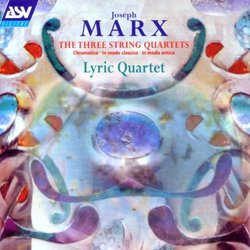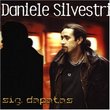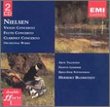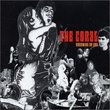| All Artists: Marx, Lyric Quartet Title: 3 String Quartets Members Wishing: 0 Total Copies: 0 Label: Asv Living Era Release Date: 3/28/2000 Genre: Classical Styles: Chamber Music, Historical Periods, Classical (c.1770-1830) Number of Discs: 1 SwapaCD Credits: 1 UPC: 743625107326 |
Search - Marx, Lyric Quartet :: 3 String Quartets
 | Marx, Lyric Quartet 3 String Quartets Genre: Classical
|
Larger Image |
CD DetailsSimilar CDs
|
CD ReviewsMasterpieces from a Virtually Unknown Master J Scott Morrison | Middlebury VT, USA | 10/08/2003 (5 out of 5 stars) "Sometimes I worry, in my reviews, that my enthusiasms carry me away and that I am much too effusive about the music I love, particularly when it is music I've just discovered. Recently I've been exploring the music of Joseph Marx (1882-1964) after being stunned at the beauty of his recently recorded 'Nature Trilogy.' It turns out that ASV is issuing a series of CDs containing Marx's music. I understand that the two piano concerti and the 'Herbstsymphonie' ('Autumn Symphony'), as well as some orchestral songs, are coming, and I can hardly wait. This CD of his three string quartets, world première recordings issued in 1999, had never come my way before, but I ordered it after I had fallen so hard for the orchestral 'Nature Trilogy.'
It's hard to imagine three quartets by the same composer that differ so much from each other. Further, if listened to in chronological order (neglecting for the moment that the 1st was revised after the 2nd and 3rd had been written) the musical language of each succeeding quartet becomes simpler than the one before it. [On the CD the quartets are in this order: 1, 3, 2, making this reverse development a little less obvious.] The First Quartet, subtitled 'Quartetto Chromatico' (written in 1936-37 and revised in 1948) is in the highly chromatic, even convoluted style one associates with Marx's fellow Austrians, Zemlinsky and Schreker. The melodies tend to move by half-steps and there tends to be a good deal of circling around tonal centers that then quickly are replaced by neighboring tones and their associated harmonies. This gives the music a restlessly knotty character, and it takes repeated listenings to retain the melodies--not to speak of the harmonies--therein. Marx was an indefatigable critic of the Second Viennese School (Schönberg, Berg, Webern) and yet the harmonies used here are almost indistinguishable from the hyperchromatism of Schönberg's early 'Verklärte Nacht' or 'Gurre-Lieder,' when he breeches the bounds of conventional Romantic harmony. The third movement, in particular, in mood as well as style, reminds one of the overripe style of the former piece of Schönberg. The Second Quartet, subtitled 'Quartetto in Modo Antico,' comprises four movements in, in order, the Mixolydian, Dorian, Phrygian, and again Mixolydian modes. Written in homage to the contrapuntal music of such composers as Palestrina, Lassus and Tallis, there is the medieval feeling associated with this harmonic language. Most striking is the slow movement, in Phrygian mode [the scale one hears by playing the white keys from E to e]; at times one is reminded some of the music of Ralph Vaughan Williams, and then one realizes it is because we associate this mode with his 'Variations on a Theme of Thomas Tallis,' in that mode and also making use of contrapuntal string writing. The last movement is a marvelous double fugue. The Third Quartet, subtitled 'Quartetto in Modo Classico,' is written in neoclassic form but, at least in part, in late Beethovenian harmonic language. His is clearly an homage to the music of Classic Period, at least in the forms used, but Marx cannot resist some added-note harmonies and a smidgen of chromaticism, although extremely mild compared to the First Quartet. The homage is absolutely genuine and heartfelt; there is none of the irony implicit in, say, Prokofiev's 'Classical Symphony' or Harold Shapero's 'Symphony for Classical Orchestra.' Perhaps, among modern composers, the feeling comes closest to that magnificent late-Beethovenian slow movement in George Rochberg's Third Quartet. The Adagio is serenely beautiful; the first time I heard it I had to go back immediately and hear it again two times. [Indeed, as I've been polishing this review I've heard it again a couple of times.] The third movement, Tempo di Menuetto, is a particularly gracious specimen that ventures occasionally into more chromatic harmonies, but its Trio reverts to a musette-like rustic drone, a charming touch, before it returns to the main theme. The Finale is a masterfully crafted contrapuntal 6/8 romp (with a 3/4 middle episode). The return of the A section incorporates the opening section of the quartet's first movement, a subtle rounding-out of the entire work. Marx orchestrated both the 2nd and 3rd quartets for string orchestra and I'd love to hear those versions. Perhaps ASV has plans to record them, too. I hope so. I honestly believe that the last two quartets deserve a place in the standard quartet literature. I cannot imagine that string quartet players would not be as amply rewarded playing them as their audiences would be. Make no mistake, this rediscovery of the music of Joseph Marx is joyful thing. As we hear more of his music--there's much more chamber music, including three piano quartets, to be heard--he will assume his rightful place in the pantheon of late Romantic composers. Enthusiastically recommended. TT=79:22 Scott Morrison" |

 Track Listings (12) - Disc #1
Track Listings (12) - Disc #1



